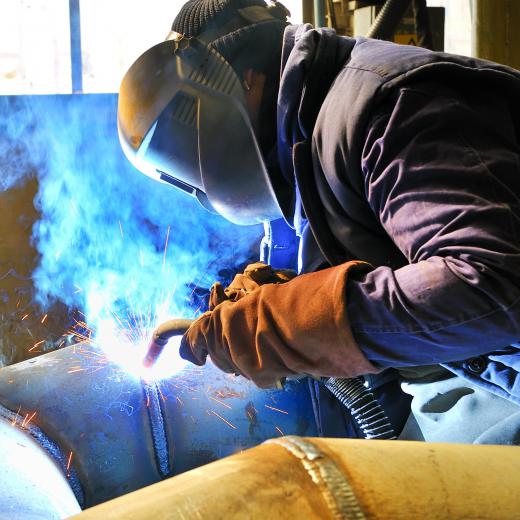While there are many different types of industrial power tools, most of them are designed to work with metal. Since wood is no longer as commonly used for parts and construction, industrial power tools, such as lathes, milling machines and arc welders, are typically meant for cutting, shaping, and combining pieces of metal. It is necessary, however, for metal to be shaped and formed in a variety of ways to create different parts. Because of this, different machines are necessary for specific manufacturing processes.
One of the most important and commonly used industrial power tools is the metal lathe. The lathe is a relatively simple piece of machinery which can finish and shape metal. The workpiece is attached to a large chuck, which spins at high revolutions. Then, a sharp stationary tool cuts away parts of the workpiece as it turns. This process, known as turning, is what can give metallic objects a smooth, shiny and precise finish.

Another piece of machinery important among industrial power tools is the milling machine. The milling machine is technically the exact opposite of the lathe; instead of having the workpiece turning at high revolutions and a sharp tool cutting it, the workpiece remains still. Milling tools, which are very similar to drill bits, cut away small or large portions of the surface of the workpiece. This allows for metal to have a perfectly flat surface, and for slots, keyholes, and other shapes to be cut.

Without lathes and milling machines, manufacturing many of the precision parts found in complicated machinery, such as automobile engines, would be near impossible. A piston on an engine, for example, needs to be turned on a lathe so that it forms a near perfect circle. The cylinder block on an engine also undergoes a honing process, where the interior wall is trimmed of any imperfections to make it almost perfectly round as well. This allows for the piston to move up and down the cylinder easily, making the engine more efficient. These precise cutting processes, known generally as machining, are responsible for manufacturing the many high-performing parts found in engines and other machines.
There is, however, more to industrial power tools than machining. Another type of tool which plays an equally important role is the welder, which comes in three main varieties. One of the most commonly used processes is gas metal arc welding (GMAW), which includes metal inert gas (MIG) and metal active gas (MAG) welders. There is also tungsten inert gas (TIG) welding and oxygen-acetylene. Different metals typically require different welders; for example, a MIG welder can weld steel and iron, but not aluminum, due to higher temperatures.
